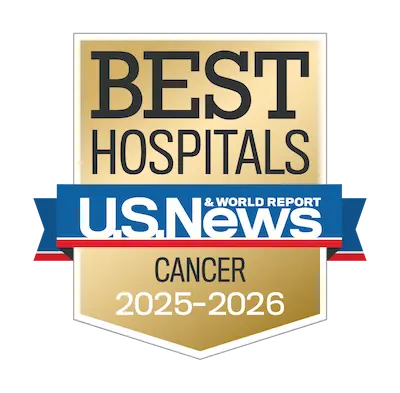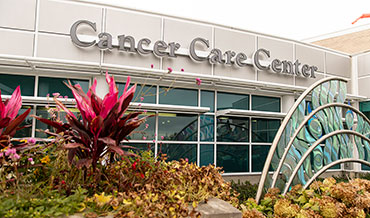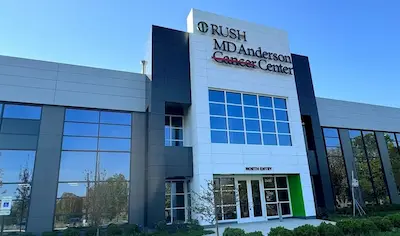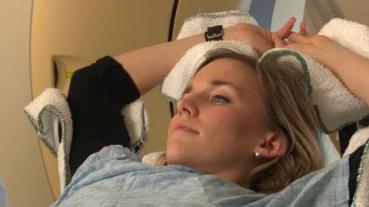Breast Cancer Symptoms
Breast cancer happens when cells in the breast grow out of control, forming a lump or tumor. If not treated, it can spread to other parts of the body. It usually starts in the milk ducts, or the areas of the breast that make milk.
See your doctor right away if you notice any of these symptoms:
- A lump near or in the breast or underarm
- Unexplained swelling of the breast
- Skin irritation or changes
- A nipple that appears sunken or inverted
- Nipple discharge
Breast Cancer Diagnosis at Rush
If you suspect you may have breast cancer, Rush can help you get a mammogram quickly.
Rush Breast Imaging Services are available at many locations across the area: our downtown Chicago campus, South Loop, Oak Park, Oak Brook, Lisle and Aurora/Fox Valley.
Our breast imaging experts can identify potential breast cancer at its early stages. They work with Rush pathologists and other breast cancer specialists to confirm a breast cancer diagnosis.
Diagnostic tests your doctor may order include:
- Blood tests, such as complete blood count
- Mammogram or 3D mammogram (tomosynthesis) of one or both breasts
- Ultrasound or automated breast ultrasound system (ABUS)
- Breast biopsy
- Breast MRI or fast breast MRI
- CEM mammography
Your diagnosis will include whether your cancer is linked to the HER2 gene. Whether you are HER2 positive or negative will affect your treatment.
The Rush Approach to Breast Cancer Treatment
At Rush, we know every woman’s breast cancer experience is unique. That’s why our breast cancer specialists start by getting to know you — getting a full picture of your overall health, family history, lifestyle and health needs.
Some patients may be seen in our comprehensive breast cancer treatment clinic in downtown Chicago. At our comprehensive clinic, you may ask questions and explore your treatment options with an entire team.
You may also choose to split your treatment across Rush locations, with chemotherapy in Lisle or Aurora/Fox Valley, for example, to be closer to home. We work with you to find the best fit for treatment.
Your team will walk you through the risks and benefits of treatments, which may include breast surgery (mastectomy, lumpectomy), chemotherapy, radiation therapy or breast reconstruction. At Rush, you'll also have access to advanced treatments like targeted therapies and clinical trials looking at new ways to treat breast cancer.
You will also have a patient navigator, who will help you through every step of your breast cancer diagnosis and treatment. Your navigator will help you coordinate your appointments, answer your questions and connect you with resources you may need.
Nurse Navigator
- A nurse navigator can help you learn as much as you want to know about breast cancer. We know some of our patients want to know as much as possible, while others prefer to take it one step at a time.
- The navigator’s goal is to help you feel better prepared to explore your treatment options.
- Your navigator will also work with you and your breast cancer providers to ensure you can seamlessly access care across Rush.
- Once you have completed treatment, the navigator works with you to create a survivor of breast cancer plan.
Jackie's Story

Nonsurgical Breast Cancer Treatments
Many types of breast cancer treatment are available, and some can be performed without invasive surgery. You can discuss these options with your breast cancer physician.
Nonsurgical breast cancer treatments may also be used together with surgical treatments. Your physician can provide you with the best options available to you and help you decide if you can successfully treat breast cancer without surgery or whether a combination of therapies will be most effective.
Medical Therapy
Medical oncologists provide breast cancer chemo and other medical therapies in Chicago, Lisle, Oak Park and Aurora/Fox Valley.
Your care team will determine your plan based on your specific type of breast cancer, its stage and your overall health, among other factors. It may include some of the following:
- Chemotherapy to kill cancer cells
- Cold cap for chemo (also known as cooling caps), which can be used during chemo to help you keep your hair. Cold caps are available at our downtown campus.
- Hormone therapy, which uses drugs like tamoxifen (which block cancer cells from using your hormones to grow) and aromatase inhibitors (which reduce the hormone production in your body)
- Biologic therapy, which uses drugs like Herceptin (trastuzumab) that directly target the cancer cells to help your body fight cancer
Breast Radiation Therapy
Rush offers a variety of types of radiation therapy at multiple locations, including Chicago, Oak Park and Aurora/Fox Valley.
Techniques and therapies include the following:
- Prone breast irradiation: You lie on your stomach so that your heart and lungs are less exposed to radiation during treatment.
- Accelerated breast irradiation: This type of whole breast irradiation cuts treatment time in half and offers the same benefits. Accelerated partial breast irradiation can help preserve the breast in early-stage cancer.
- Deep inspiration breath hold: This technique helps minimize radiation exposure to your heart — while not affecting the amount delivered to the tumor — during treatment for cancer in the left breast.
- Intraoperative radiation therapy (IORT): Radiation is delivered during surgery to avoid weeks of radiation therapy following surgery.
- Brachytherapy: High-dose brachytherapy (a form of internal radiation therapy) can significantly shorten radiation treatment.
Occupational Therapy
After treatment, you may be referred to a Rush occupational therapist, who can help you do the following:
- Address lymphedema and other side effects from treatment
- Overcome difficulties performing everyday tasks caused by reduced arm strength from treatment
Genetic Testing and Counseling
Rush offers genetic testing and counseling for people with a family history of breast cancer. If you are from a high-risk family, testing may help you find out if you carry the BRCA1, BRCA2 or another genetic mutation that increases your breast cancer risk.
Support Services
Rush offers a variety of support services to help your emotional and physical well-being during treatment. These include the following:
- Nutritional support
- Financial counseling
- Social workers and psychologists
- Therapeutic memberships at Rush Copley Healthplex
- Yoga, massage, acupuncture and other complementary therapies
- Wellness resources at Waterford Place Cancer Resource Center in Aurora
Surgical Breast Cancer Treatments
Breast cancer is unique compared to other surgically treated cancers because there are more surgical options.
These can range from double mastectomy, or complete removal of both breasts, to less invasive surgeries like lumpectomy, or direct removal of the tumor and surrounding tissue.
Your doctors will educate you about your options for treatment and surgical breast reconstruction if necessary. You will make a shared decision about the best surgical option for you.
Breast Cancer Surgery
Surgical oncologists perform breast cancer surgery at downtown Chicago and Aurora/Fox Valley locations.
- Mastectomy: Rush offers several types of mastectomy (surgery to remove one or both breasts), including nipple-sparing mastectomy and skin-sparing mastectomy.
- Lumpectomy: Rush offers lumpectomy surgery to remove a breast tumor and some of the normal tissue around it.
- Marking tumors before surgery: Rush University Medical Center and Rush Copley Medical Center offer magnetic seed localization to mark breast tumors before lumpectomy. Magnetic seed localization addresses many of the complications that wire localization presents, such as discomfort.
Breast Reconstruction
Your breast surgeon will discuss your breast reconstruction options with you before your breast cancer surgery. Your surgeon will also connect you to a plastic surgeon who specializes in breast reconstruction.
Reconstruction after mastectomy is available in two ways:
- Breast reconstruction at the same time as your mastectomy
- Delayed breast reconstruction, in which your reconstruction may take place after your mastectomy
Getting a Second Opinion on Breast Cancer Treatment
Have you been diagnosed with breast cancer? Consider a second opinion from RUSH MD Anderson. A second opinion can help you explore all your options and begin treatment with confidence and clarity.
RUSH MD Anderson offers easy access to second opinions, including free virtual intake visits with our knowledgeable nurse navigators for anyone in Illinois.
Rush Excellence in Breast Cancer Care Treatment
- Nationally ranked experts focused on you: Our cancer specialists are ranked among the best in the nation by U.S. News & World Report. They work with you to create a personalized treatment plan to improve your quality of life and well-being.
- Breast imaging centers of excellence: Rush’s five breast imaging centers are designated as centers of excellence by the American College of Radiology. This designation recognizes Rush’s expertise, advanced technology and commitment to the highest standards of breast cancer screening.
- Multiple specialists, one appointment: You may receive care through The Coleman Foundation Comprehensive Breast Cancer Clinic at Rush University Medical Center. In this clinic, you’ll meet with your breast cancer care team — which may include your medical oncologist, radiation oncologist, breast surgeon, plastic and reconstructive surgeon and nurse coordinator — together in a single visit.
- Access to leading-edge treatments: At Rush, you’ll have access to treatment you won't find elsewhere — through clinical trials looking into new ways to fight breast cancer.
- Advanced breast reconstruction options: Our specially trained plastic and reconstructive surgeons work hand in hand with our breast surgeons to give you the most advanced options, including lumpectomy (breast conserving surgery), mastectomy and breast reconstruction.
- Monitoring your heart health during treatment: Rush University Medical Center's breast cancer team includes a cardio-oncologist. This is a heart expert who specializes in monitoring your heart health during your chemo and radiation therapy and after you finish cancer treatment.
- Reducing chemotherapy-related hair loss: If you need chemotherapy for breast cancer, you may have access to innovative scalp cooling technology that limits hair loss from treatment. Studies have found that patients who used the scalp cooling cap were able to keep much of their hair during treatment.
- Supportive oncology care: At Rush University Medical Center and Rush Copley Medical Center, you'll have access to supportive care services to help you through treatment. They include acupuncture, massage, yoga, mental health counseling, lymphedema management, nutritional counseling, financial counseling and more. Waterford Place Resource Center in Aurora offers a wide range of services, free of charge, to anyone who has been diagnosed with cancer.
- Care where and when you need it: Breast cancer treatment requires regular visits, many weekly. Once treatment is over, you may also require lifelong follow-up care. Our breast cancer specialists will meet you closer to home at convenient locations, including Chicago, Lisle, Oak Park and Aurora/Fox Valley.
- Supporting your continued health after treatment: In addition to support services available during treatment, Rush also offers services to alleviate the side effects you may experience after treatment. Your care at Rush doesn’t stop at the end of treatment: We’re here to support you long-term.













